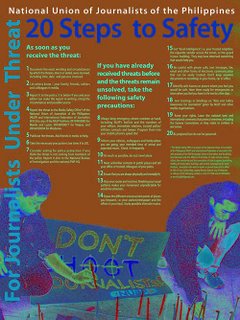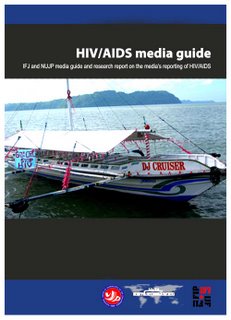Here's the NUJP statement on the event:
NUJP launches "20 Steps to Safety Campaign" for journalists and Media Guide for HIV/AIDS Reporting
The National Union of Journalists of the Philippines (NUJP) held yesterday the back-to-back launching of its "20 Steps to Safety" campaign and the Media Guide on HIV/AIDS Reporting at the Newsdesk Café in Quezon City. Simultaneous launchings were also held in Subic and Iloilo City.
"While they may seem unrelated, both actually address very important issues that journalists should be concerned with – journalists' safety and accurate and sensitive reporting," said Jose Torres Jr., NUJP chairperson.
"20 Steps to Safety" information campaign
With the number of Filipino journalists being killed each year, safety training and awareness is a must to keep journalists safe and alive.
 The Media Safety Office of the NUJP and International Federation of Journalists formally launched the poster and reporter's notebook that contain what it calls "20 Steps to Safety". These are practical tips and information for journalists facing threats or covering sensitive issues or dangerous areas.
The Media Safety Office of the NUJP and International Federation of Journalists formally launched the poster and reporter's notebook that contain what it calls "20 Steps to Safety". These are practical tips and information for journalists facing threats or covering sensitive issues or dangerous areas.NUJP has recorded 84 media killings since 1986, 47 under the administration of President Gloria Macapagal-Arroyo and 11 this year.
Torres noted that many of the slain journalists received threats before being killed. He appealed to his colleagues to take seriously whatever type of threats they receive and to take the necessary precautions.
The reporters' notebook and poster are available at the IFJ-NUJP Media Safety Office. Local NUJP chapters may also be contacted for copies.
Media guide for sensitive and accurate reporting
The Media Guide for HIV/AIDS Reporting contains useful information for journalists that would help them in their coverage of HIV/AIDS cases and related issues. It provides basic information on HIV/AIDS, suggests possible story approaches, defines commonly used medical terms and corrects common mistakes. Most of all, it stresses sensitive and ethical reporting, particularly when interviewing persons living with HIV/AIDS.
 The launching of the media guide is the culmination of a year-long project that included the holding of eight training workshops attended by a total of almost 200 journalists from different parts of the country. The workshops were held in Pampanga, Subic, Sorsogon, Iloilo, Cebu, Davao, Zamboanga and Batangas. The project also included research on Philippine media's reporting of HIV/AIDS, the results of which are also in the media guide.
The launching of the media guide is the culmination of a year-long project that included the holding of eight training workshops attended by a total of almost 200 journalists from different parts of the country. The workshops were held in Pampanga, Subic, Sorsogon, Iloilo, Cebu, Davao, Zamboanga and Batangas. The project also included research on Philippine media's reporting of HIV/AIDS, the results of which are also in the media guide.The Philippine project is part of a six-country IFJ project aimed at improving reporting of HIV/AIDS in Africa and Asia, supported by the Swedish trade union movement, the LO-TCO. The project's six target countries are Cambodia, India, Nigeria, the Philippines, South Africa and Zambia.
NUJP hopes these two initiatives will result in greater safety awareness among Filipino journalists as well as improved coverage of the HIV/AIDS situation in the country.





No comments:
Post a Comment